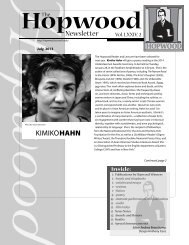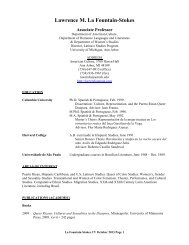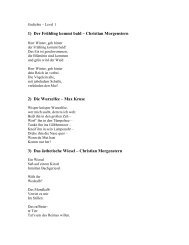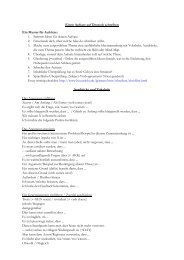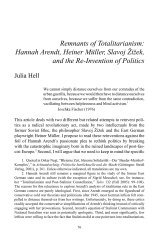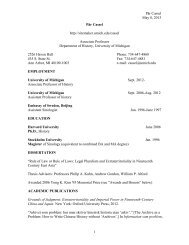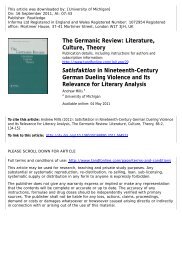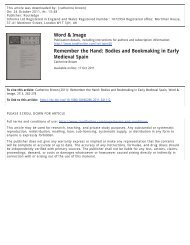Making History Personal: Constantine Cavafy and the Rise of Rome
Making History Personal: Constantine Cavafy and the Rise of Rome
Making History Personal: Constantine Cavafy and the Rise of Rome
You also want an ePaper? Increase the reach of your titles
YUMPU automatically turns print PDFs into web optimized ePapers that Google loves.
Frier, “<strong>Making</strong> <strong>History</strong> <strong>Personal</strong>,” page 26<br />
sage is clear enough. As E.M. Forster said <strong>of</strong> <strong>Cavafy</strong> himself, “But so much is certain—ei<strong>the</strong>r<br />
life entails courage, or it ceases to be life.” 86<br />
In <strong>Cavafy</strong>’s poems that deal, in one way or ano<strong>the</strong>r, with <strong>Rome</strong>’s conquest <strong>of</strong> <strong>the</strong> Medi-<br />
terranean, few actual Romans are mentioned: no arrogant generals, no rapacious governors, al-<br />
though in fact <strong>the</strong> Roman Senate dispatched many such. <strong>Cavafy</strong> seems attracted chiefly to those<br />
Romans <strong>of</strong> <strong>the</strong> late Republic, such as Horace or Antony, who, although <strong>the</strong>y remain distinctively<br />
“Roman,” none<strong>the</strong>less, at least in <strong>Cavafy</strong>’s portrayal, have become thoroughly imbued with <strong>the</strong><br />
87<br />
culture <strong>of</strong> <strong>the</strong> Hellenistic East. But Antony’s situation is no longer as in “The End <strong>of</strong> Antony,”<br />
where, in his final moments, his Romanitas emphatically reasserts itself in confronting <strong>the</strong> con-<br />
ventional Egyptian <strong>the</strong>atrics <strong>of</strong> grief. To be sure, in <strong>the</strong> later poem Antony’s hesitation in accept-<br />
ing his fate might be interpreted somewhat similarly; why, for instance, does he require such re-<br />
peated self-admonition? His temptation was to lament his own choices, “<strong>the</strong> plans you made for<br />
life, / which turned out wrong,” <strong>and</strong> to blame <strong>the</strong>se choices, or his own weakness <strong>of</strong> will, for his<br />
ultimate defeat. (In fact, <strong>the</strong> judgment <strong>of</strong> ancient historians, like Plutarch, runs much along this<br />
line. 88 ) But in <strong>the</strong> second half <strong>of</strong> <strong>the</strong> poem Antony successfully fights against this temptation as<br />
“one who’s long prepared, like someone brave, / as befits a man who’s been blessed with a city<br />
like this.” 89 In this respect, Antony is correctly regarded, so <strong>Cavafy</strong> suggests, not as one led as-<br />
tray from a better (more Roman) course by <strong>the</strong> allure <strong>of</strong> <strong>the</strong> luxurious East. Instead, in his very<br />
succumbing to <strong>the</strong> enticements <strong>of</strong> Alex<strong>and</strong>ria he has proven himself worthy <strong>of</strong> <strong>the</strong> city; <strong>and</strong> even<br />
as <strong>the</strong> end nears he is reinvigorated by <strong>the</strong> luxuriant sounds <strong>of</strong> <strong>the</strong> Alex<strong>and</strong>ria he loves so<br />
much. 90<br />
(The seductress Cleopatra has, <strong>of</strong> course, entirely vanished from this process.)<br />
86<br />
Forster, “<strong>Cavafy</strong>,” in Alex<strong>and</strong>ria (2004) 249.<br />
87<br />
But Benne, Marcus Antonius (2001) 99-112, argues that Antony was no more Philhellenic than o<strong>the</strong>r contemporary<br />
Roman statesmen; in any case, this “character flaw” was clearly accentuated by Octavian’s propag<strong>and</strong>a.<br />
88<br />
See <strong>the</strong> synkrisis, 3.3: “Antony … was <strong>of</strong>ten disarmed by Cleopatra, subdued by her spells, <strong>and</strong> persuaded to<br />
drop from his h<strong>and</strong>s great undertakings <strong>and</strong> necessary campaigns …”<br />
89<br />
So Mendelsohn, Collected Poems (2009) 10. But this mistranslates αξιώθηκες, a verb crucial to <strong>the</strong> poem.<br />
Correct already was Forster, Alex<strong>and</strong>ria (2004) 82, who renders <strong>the</strong> line: “like to <strong>the</strong> man who was worthy <strong>of</strong> such a<br />
city”; even better is Sachperoglou’s “as befits you who were deemed worthy <strong>of</strong> such a city,” Collected Poems<br />
(2007) 35. Keeley <strong>and</strong> Sherrard, <strong>Cavafy</strong> (1975), originally rendered <strong>the</strong> line “as is right for you who were given this<br />
kind <strong>of</strong> city”; in <strong>the</strong> revised edition (2009) 61, correctly amended to “as is right for you who proved worthy <strong>of</strong> this<br />
kind <strong>of</strong> city.” I am grateful to Vassilios Lambropoulos for confirming this point.<br />
90<br />
Durrell, Alex<strong>and</strong>ria Quartet (1962) 17: “[N]one <strong>of</strong> us is properly to be judged for what happened in <strong>the</strong> past.<br />
It is <strong>the</strong> city which should be judged though we, its children, must pay <strong>the</strong> price.”



